By David Monti, @d9monti
(c) 2017 Race Results Weekly, all rights reserved
Rupp, Dibaba Dominate At Bank of America Chicago Marathon
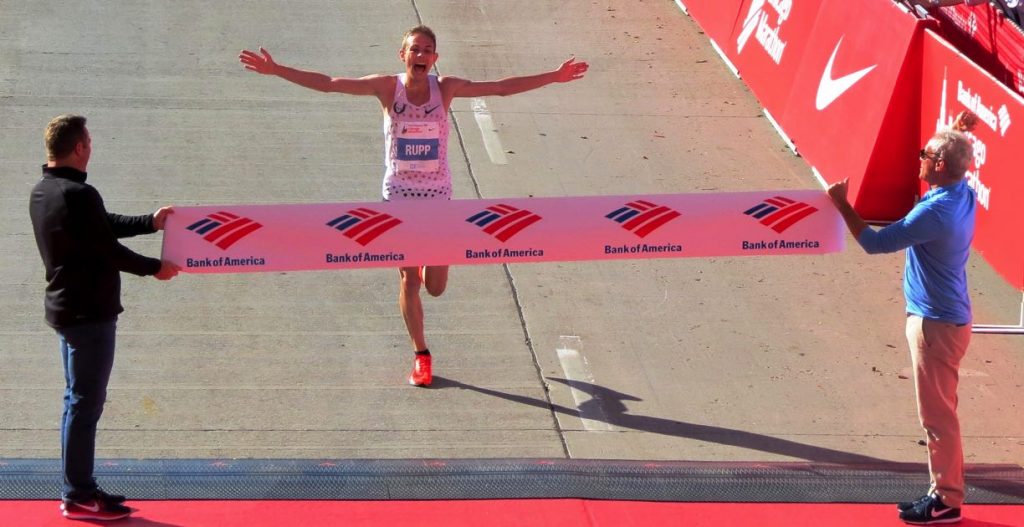
CHICAGO (08-Oct) — With powerful second half performances, Galen Rupp and Tirunesh Dibaba won the Bank of America Chicago Marathon here handily, overwhelming strong fields on a warm and sunny day that saw some of the world’s best runners drop out. They recorded times of 2:09:20 and 2:18:31, respectively, in what was the 40th edition of America’s second-largest marathon. Also, Rupp became the first American man to win here since Khalid Khannouchi in 2002.
Close behind Dibaba in third place, American Jordan Hasay ran a sensational 2:20:57 in just her second marathon, making her the second-fastest American woman of all time behind only Deena Kastor. She topped Joan Samuelson’s USA course record here of 2:21:21 set back in 1985.
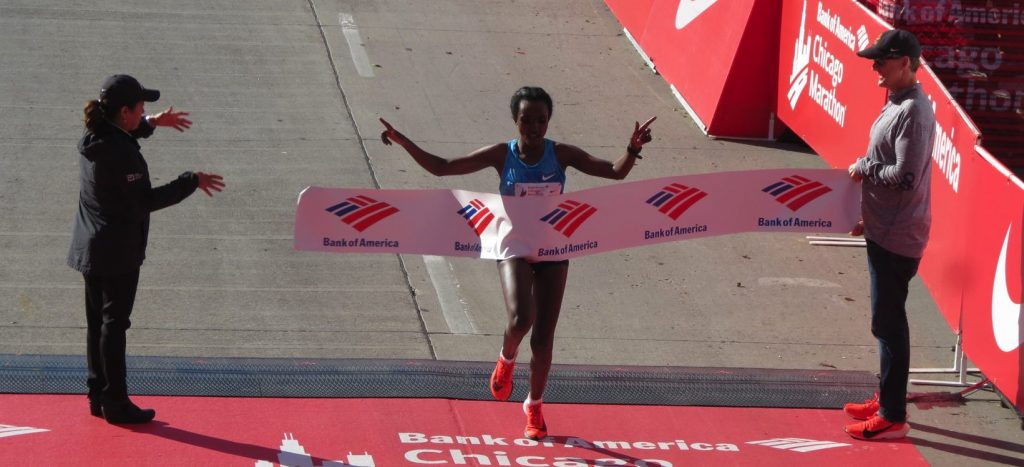
SLOW START FOR THE MEN
In the third consecutive edition of this race with no pacemakers, none of the top men were keen to push the pace in the early kilometers. American Aaron Braun, who wanted to run in the 2:11 to 2:12 range, led a 27-man lead pack through 5 km in a tepid 15:43, a 2:12:37 pace. That pack stayed largely intact through halfway and things barely picked up with a half-marathon split 1:05:49. That was fine with Rupp.
“Coming in, taking to my coaches, my plan was to be invisible for the first 20, 22 miles,” Rupp told reporters after the race. “Here I think it was really important for me to sit back, relax and conserve energy.”
Although the temperature was a comfortable 15C at the start, the sun was out and Chicago’s open course offers very little shade. The top athletes started to glisten with sweat, and some of the top names in the field were having trouble keeping up and had to drop out. Stanley Biwott, the 2015 TCS New York City Marathon champion, was with the leaders at 25 km, but wouldn’t make it to the 30 km checkpoint. World record holder Dennis Kimetto was leading at halfway, but soon after was seen by race spotters limping on the side of the course and never made it to 25 km.
Rupp, however, was feeling comfortable and was content to wait.
“You know, I hadn’t really planned out when I was going to go,” he said in his post-race television interview. “I definitely wanted to wait, at least 20 miles, 22 miles. The longer the better. I’ve made the mistake in the past of going too hard, too soon; you’ve still got a long way to go, several miles. So, I really wanted to wait.”
At the 30 km checkpoint, ten men were still in contention: Rupp, defending champion Abel Kirui, Bernard Kipyego, half-marathon world record holder Zersenay Tadese, Ezekiel Chebii, Chris Derrick, Olympic silver medalist Feyisa Lilesa, Sisay Lemma, Sam Chelanga and Stephen Sambu. Rupp decided to wait for the 35th kilometer before upping the tempo, and the race got serious in a hurry. The 35th kilometer went down in 2:50, and by the 35 km checkpoint only Rupp, Kirui, Lemma, Kipyego and Sambu were left. Rupp decided it was time to go for the kill.
“At that point, you have to be all in,” Rupp explained. “You can’t think you’re going to go and back off. You have to drive all the way to the finish line.”
Rupp ran the five kilometers through 40 km in 14:25, easily the fastest 5 km segment of the race, putting the race out of reach. For good measure, he ran the 41st kilometer in 2:38, the fastest kilometer of the race. He ran his second half in 1:03:30.
“It’s just incredible,” Rupp said of the feeling of breaking the finish line tape here in the city where his father grew up. “You know, you train so hard year-in and year-out, day-in and day out. To have a race like this where it all comes together and be able to win in a city which is such a special place for me given that my dad grew up here. Words can’t describe the feeling of crossing the line, seeing my family, my coach.”
Kirui was a clear second in 2:09:48, and Kipyego passed Lemma to take third, 2:10:23 to 2:11:01. Sambu, who made his debut here last year, finished fifth in 2:11:07. Back in ninth place, American Chris Derrick made a successful marathon debut in 2:12:50, and Lilesa finished 14th in 2:14:49.
DIBABA ON CRUISE CONTROL
Dibaba, who made an exceptional marathon debut at the Virgin Money London Marathon last April in 2:17:56 –the fifth-fastest performance of all time– was the leader of the women’s race from the gun. She was intent on running fast first, then would worry about sorting out the top places later.
“I actually wasn’t running against anyone, but was just running to improve my personal best,” Dibaba told reporters later with the help of an interpreter.
Dibaba ran the first four 5-kilometer segments in 16:08, 16:20, 16:34, and 16:33, and hit halfway in 1:08:48. Four other women managed to hold that pace: defending champion Florence Kiplagat, Brigid Kosgei, Valentine Kipketer, and Hasay. The group was running at a 2:18:22 pace, and Hasay decided that she should try to hang on, despite running well under American record pace.
“One of the reasons I went with the lead pack today is that I wanted to be up there,” Hasay explained. “I could have run my own pace today (but), I think it’s important to show we can compete with them. Obviously, it can be really intimidating.”
Dibaba’s next three 5-kilometer segments just couldn’t be matched by her competitors: 16:24, 16:29, and 16:22 through 35-K. Kiplagat never made it to 30-K and dropped out. Kosgei managed to stay close through 30-K, but then had to let go and would finish second in a personal best 2:20:22. Kipketer struggled, slowed badly, and ended up fifth in 2:28:05.
Hasay, in perhaps her most determined effort of her career, hung on and talked her way through the final kilometers. She said she thought of her late mother and the hard workouts she had done under coach Alberto Salazar. Positive self-talk was the key, she said.
“The whole last part was really tough,” Hasay admitted. She continued: “I just tried to go mile by mile.”
Hasay’s 2:20:57 was extraordinary. She had only run her marathon debut last April in Boston in an impressive 2:23:00, and to drop that time by over two minutes was surprising, especially for the 26 year-old athlete who is originally from Arroyo Grande, Calif.
“I’m really grateful,” Hasay said. “I always hoped I’d be great at the marathon.” She continued: “For this to go so well, this is in some ways a relief.
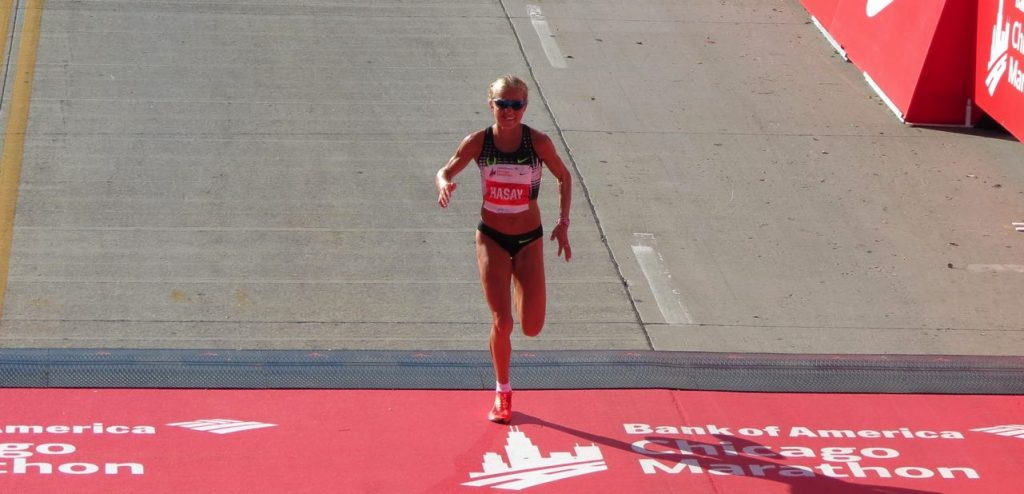



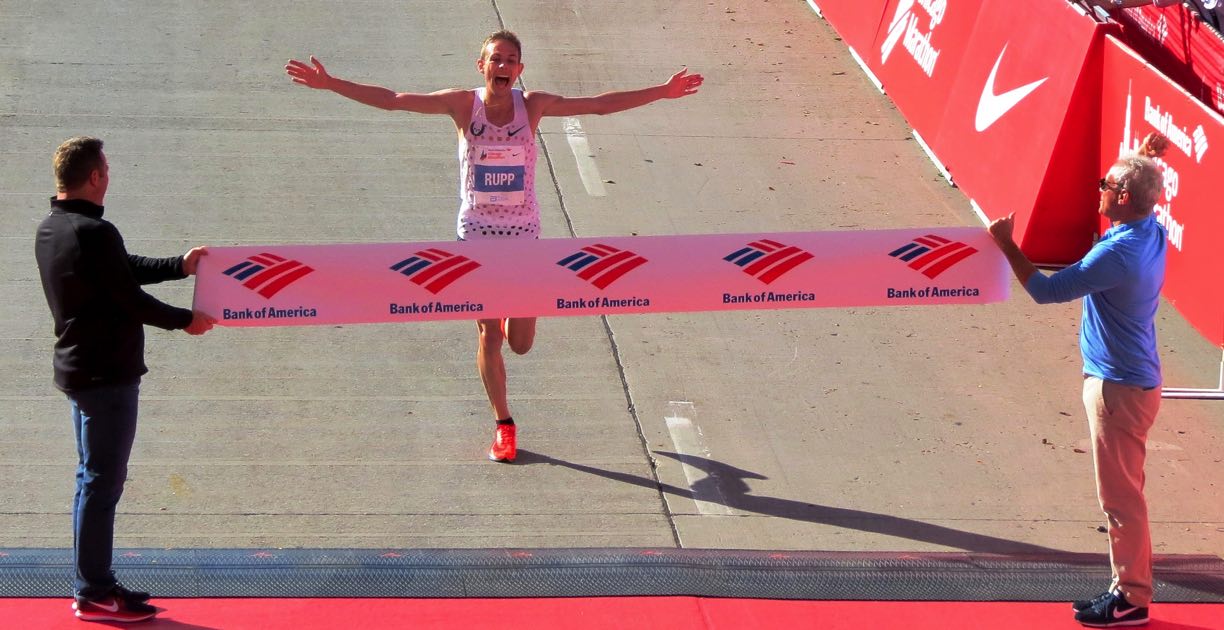
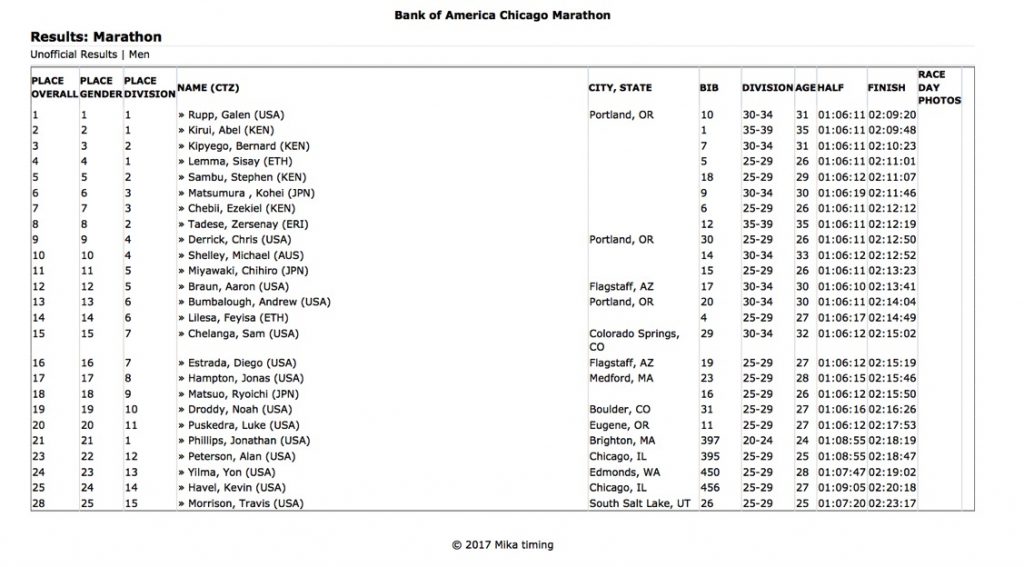
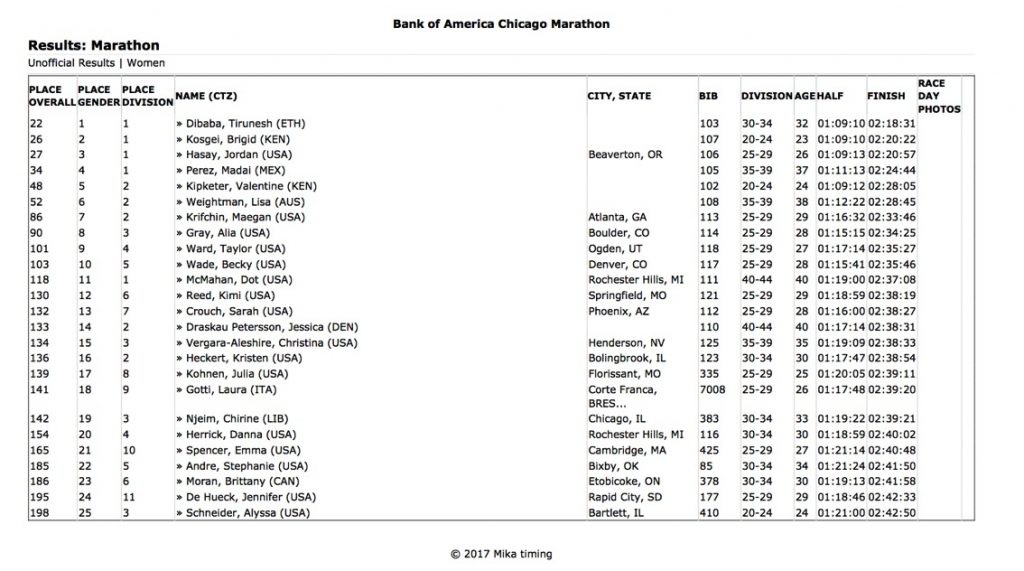
Thank you — I really appreciate the excelllent writing here. One small note: I believe Ms. Dibaba made her marathon debut at London in 2014 (not 2017, as stated above). She ran 2:20:35 there, which was an impressive debut.